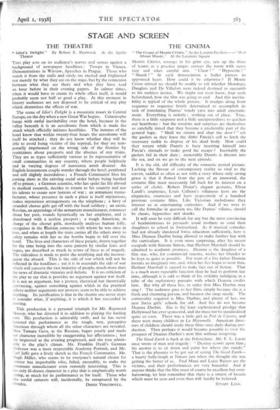STAGE AND SCREEN
THE THEATRE
f' Idiot's Delight." By Robert E. Sherwood. At the Apollo Theatre
Tins play acts on its audience's nerves and senses against a background of newspaper headlines : Troops in Vienna, Demonstrations in Warsaw, Speeches in Prague. Those who watch it from the stalls and circle are excited and frightened not merely by what they see on the stage, but by the connexion between what they see there and what they have read an hour before in their evening papers. In calmer times, when it would have to create its whole effect itself, it would probably seem not half so good a play. At this moment in history audiences are not disposed to be critical of any play which dramatises the effects of war.
The scene of Idiot's Delight is a mountain resort in Central Europe, on the day when a new Great War begins. Catastrophe hangs with awful inevitability over the hotel, because in the valley beneath it is an aerodrome from which is made the attack which officially initiates hostilities. The inmates of the hotel know that within twenty-four hours the aerodrome will itself be attacked ; they do not know whether they will be able to avoid being victims of the reprisal, for they are tem- porarily imprisoned on the wrong side of the frontier by restrictions about passports and the absence of any trains. They are as types sufficiently various to be representative of small communities in any country, where people helplessly and in varying degrees of innocence await disaster. An English honeymoon couple wander through the hotel, perplexed and still slightly incredulous ; a French Communist fires his parting shots at the existing social order before being hustled off to prison ; a German scientist, who has spent his life abroad in medical research, decides to return to his country and use his talents to create new horrors of war ; an armament manu- facturer, whose presence in such a place is itself mysterious, makes mysterious arrangements on the telephone ; a bevy of stranded chorus girls get off with the local soldiery ; an exotic Russian, an appendage of the armament manufacturer, romances about her past, rounds hysterically on her employer, and is abandoned with a useless passport ; a tough American, in charge of the chorut girls, mordantly analyses human folly, recognises in the Alsatian someone with whom he was once in love, and when at length the train carries all the others away to safety remains with her as the bombs begin to fall over the hotel. The lives and characters of these people, drawn together for the time being into the same pattern by similar fears and hopes, are described as much in terms of farce as of tragedy. The ridiculous is made to point the terrifying and the inconse- quent the absurd. This is the side of war which will not be reflected in the headlines ; yet it is in essentials the side of war which will concern the vast majority of people, much more than the news of dramatic victories and defeats. It is no criticism of the play to say that it provides no argument against war itself. It is not an argument, but a protest, rhetorical but theatrically convincing, against something against which in the practical sphere neither arguments nor protests seem to be able to achieve anything. Its justification is that in the theatre one never stops :o consider what, if anything, it is which it has succeeded in -roving.
This production is a personal triumph for Mr. Raymond Massey, who has directed it in addition to playing the leading part. His production is admirably swift, and he has never bettered this performance as the tough, wry, perceptive -lunerican through whom all the other characters are revealed. Miss Tamara Geva, as the Russian, began poorly and made 'ler character incredible by exaggerating her affectations ; but she improved as the evening progressed, and she rose admir- ably to the play's climax Mr. Franklin Dyall's German Professor was a most respectable Academy Portrait, and Mr. Carl Jaffe gave a lively sketch as the French Communist. Mr. Hugh Miller, who seems to be everyone's natural choice for ,inister but improbable roles, failed, excusably, to make the armament manufacturer even remotely interesting. This is the only ill-drawn character in a play that is emphatically worth 'eeing, as much for its performance as for itself. Those who tike sordid cabarets will, incidentally, be enraptured by the














































 Previous page
Previous page